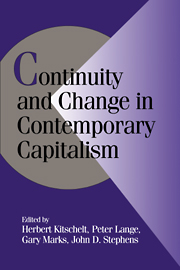Book contents
- Frontmatter
- Contents
- List of Contributors
- Preface
- Introduction
- PART I THE INTERNATIONAL SETTING FOR POLITICAL-ECONOMIC STRATEGIES
- PART II THE DYNAMICS OF DOMESTIC POLITICAL ECONOMIES
- PART III POLITICAL ECONOMY AND DEMOCRATIC COMPETITION
- 10 Politics without Class: Postindustrial Cleavages in Europe and America
- 11 European Social Democracy between Political Economy and Electoral Competition
- 12 Contemporary Christian Democracy and the Demise of the Politics of Mediation
- 13 The Political Economy of Neoliberalism: Britain and the United States in the 1980s
- 14 Movements of the Left, Movements of the Right: Putting the Mobilization of Two New Types of Social Movements into Political Context
- PART IV CONCLUSION
- References
- Index
- Title in the series
12 - Contemporary Christian Democracy and the Demise of the Politics of Mediation
Published online by Cambridge University Press: 05 June 2012
- Frontmatter
- Contents
- List of Contributors
- Preface
- Introduction
- PART I THE INTERNATIONAL SETTING FOR POLITICAL-ECONOMIC STRATEGIES
- PART II THE DYNAMICS OF DOMESTIC POLITICAL ECONOMIES
- PART III POLITICAL ECONOMY AND DEMOCRATIC COMPETITION
- 10 Politics without Class: Postindustrial Cleavages in Europe and America
- 11 European Social Democracy between Political Economy and Electoral Competition
- 12 Contemporary Christian Democracy and the Demise of the Politics of Mediation
- 13 The Political Economy of Neoliberalism: Britain and the United States in the 1980s
- 14 Movements of the Left, Movements of the Right: Putting the Mobilization of Two New Types of Social Movements into Political Context
- PART IV CONCLUSION
- References
- Index
- Title in the series
Summary
This chapter starts from an intriguing observation: the historical fate of the Christian democratic parties of continental western Europe does not seem to be determined solely or linearly by the declining impact of religion on social and political attitudes. The survival of Christian democratic parties in the 1970s, their capacity to adapt to the changing conditions of the 1980s and their diverging electoral paths in the 1990s indicate that – contrary to expectations – the impact of the transformation of the religious structure on the appeal of Christian democratic parties has been neither straightforward nor immediate. The anticipated association between secularization and the decline of religiously motivated social and political movements is variable and puzzling.
The questions that govern this chapter originate from this ostensible incongruity between social structural changes and diverging political outcomes. How has Christian democracy been able to survive politically in a social context marked by mounting secularization? What kinds of social coalitions has Christian democracy fostered in the 1980s that help explain its electoral endurance? What kind of political economy have the parties attempted to nourish and to what extent has a specific set of social and economic policies helped sustain their electoral appeal? Can the contemporary diverging electoral paths and governmental records of national parties, with the Italian Democrazia Cristiana (DC) (remodeled as the Partito Popolare Italiano, PPI) at the low end, the German Christlich- Demokratische Union/Christlich-Soziale Union (CDU/CSU) at the high end, and the Dutch Christen Democratisch Appèl (CDA) somewhere in between, be explained in terms of the different ways in which these parties are located in their political economies?
- Type
- Chapter
- Information
- Continuity and Change in Contemporary Capitalism , pp. 346 - 370Publisher: Cambridge University PressPrint publication year: 1999
- 25
- Cited by



